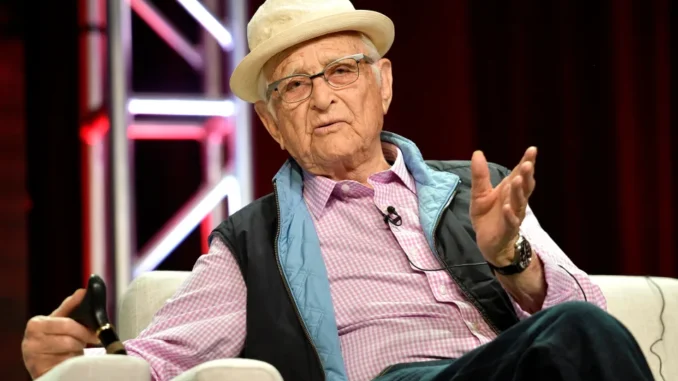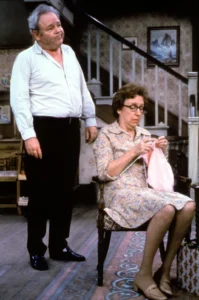
Anyone who has ever been thankful to call a sitcom “adult,” “real” or “relevant” owes that thanks to Norman Lear.
With one startling ‘70s outburst of creativity, Lear, who died Tuesday at 101, swept away a stagnant legacy of silly, airy comedies − sometimes mindlessly diverting, more often just mindless − and replaced them with a more reality-driven sitcom form that tackled the important issues of the day. At the 1975 peak of his producing success, he had five shows on the air − “All in the Family,” “Maude,” “Sanford and Son,” “Good Times” and “The Jeffersons” − and all were in the Top 10. That’s a sweep that will be hard to top.
Lear was busy through his 90s, serving as executive producer of a critically acclaimed Netflix reboot of his ’70s hit “One Day at a Time,” re-creating classic episodes for live ABC specials and producing and hosting a documentary series, “America Divided.” He also wrote a memoir in 2014, “Even This I Get to Experience.” In 2017, he became the oldest recipient of the Kennedy Center Honors.
Not one to dwell in the past, Lear explained his life philosophy to USA TODAY when asked to compare producing the two versions of “One Day”: “I’m having more fun (with the reboot) because it’s now,” he said. “Then is a memory. Today is the moment.”

‘All in the Family’ was a revolutionary change for TV sitcoms
It’s hard to overstate the import or impact of his first big hit, “All in the Family” − a thoroughly Americanized version of the British hit “Till Death Us Do Part.” It premiered in 1971, when the country seemed on the verge of splintering over Vietnam, race relations and the sexual revolution. Yet television at the time preferred to pretend nothing had changed from the days of the medium’s infancy, blissfully hiding behind such lingering sitcom hits as “Here’s Lucy,” “Mayberry R.F.D.,” “My Three Sons” and “The Doris Day Show.”
And then came “Family” and Archie Bunker (so indelibly embodied by Carroll O’Connor), a bitter, blue-collar stiff from Queens who had no use for anyone of any race, religion or sexual or political persuasion but his own − and who spewed his opinions with the kind of bigotry TV no longer uses. Week after week, he battled with his liberal “meathead” – Archie’s term – of a son-in-law (Rob Reiner), while his daughter (Sally Struthers) cried and his wife (the brilliant Jean Stapleton), whom he christened “dingbat,” dithered and stifled. And Americans gasped, and then laughed, as one.
Well, not immediately. “All In the Family” struggled in the ratings for its first half-season, to the point where some feared it would be canceled. But CBS gave the show’s repeats a huge summer push, and by the time it returned the next fall, it began a five-year run at the top – with the highest ratings of any comedy since “The Beverly Hillbillies.” The only sitcom since to top the ratings peak of “All in the Family” was “The Cosby Show” − and in these days of splintered audiences, no series will ever come close again.
“Family” was revolutionary, but Lear spoke matter-of-factly of the show’s gritty focus in a 2009 interview with USA TODAY: “I was interested in family, and we were dealing with what families deal with. I don’t think I consciously thought that anything we were doing was controversial.”
His norm-shattering ways made him an icon with later generations of cutting-edge producers, exemplified by his collaboration with “South Park” creators for a 2003 episode.
It was a triumph for Lear, a veteran TV and film writer with an Oscar nomination for “Divorce, American Style,” to his credit. It could also count as sweet revenge: He had tried twice before to sell “Family” to ABC, with different actors playing the kids. Maybe the time was right, maybe the cast was better, maybe CBS was smarter or luckier. Either way, Lear and his producing partner, Bud Yorkin, had a hit on their hands.